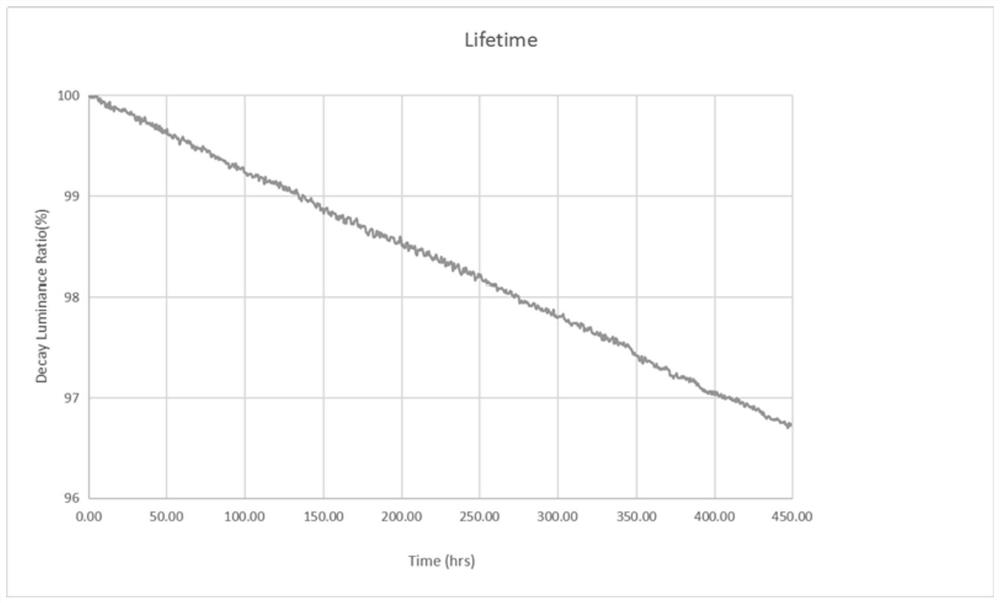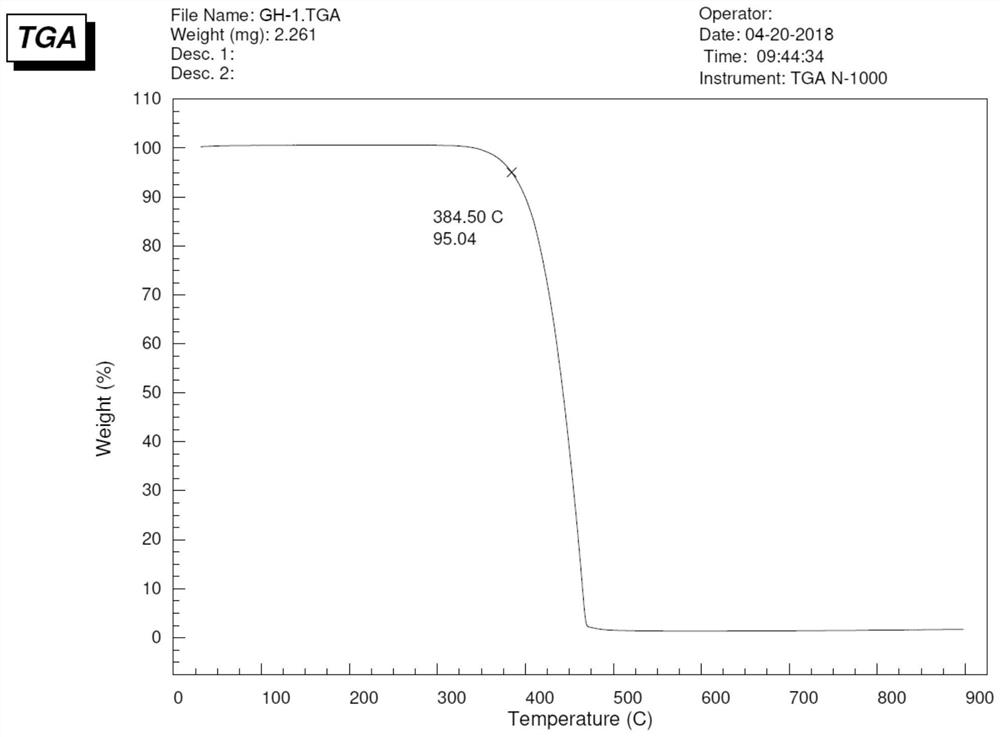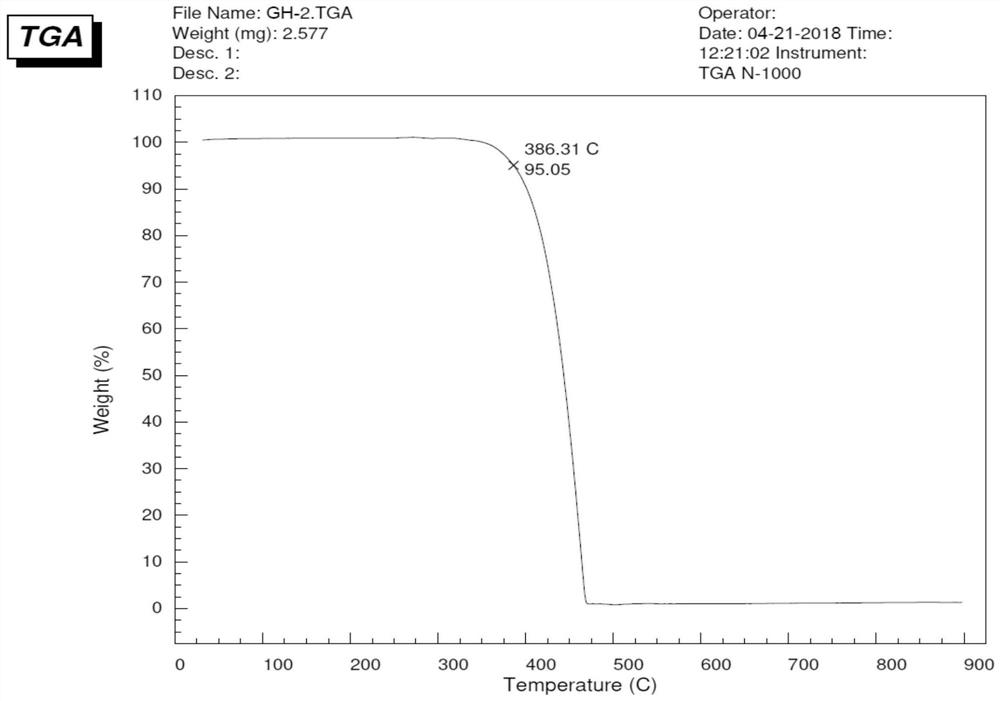Bipolar green phosphorescent host material and organic electroluminescent device
A technology of electroluminescent devices and green phosphorescence, which is applied in the direction of luminescent materials, electric solid devices, semiconductor devices, etc., can solve the problems of late start and achieve the effects of increasing torque, reducing crystallinity, and reducing coplanarity
- Summary
- Abstract
- Description
- Claims
- Application Information
AI Technical Summary
Problems solved by technology
Method used
Image
Examples
Embodiment 1
[0046]
[0047] The preparation method of the bipolar green phosphorescent host material (1) is as follows:
[0048] (1)
[0049]
[0050] Compound 1-a (1-bromo-3-(difluoro(phenyl)methyl)benzene) (5g, 281.99g / mol, 17.73mmol), compound 1-b ((4,6-diphenyl-1,3,5 -triazin-2-yl)boronic acid) (1eq, 4.91g, 277.1g / mol, 17.73mmol) and sodium carbonate (2eq, 3.76g, 105.99g / mol, 35.46mmol) were added to ethylene glycol diamine ether ( 100g, 20 times the mass of compound 1-a) and water (100g, 20 times the mass of compound 1-a), after stirring and mixing, add tri(o-tolyl)phosphine (3%eq, 0.162g, 304.37 g / mol, 0.53mmol) and palladium (II) acetate (0.5%eq, 0.019g, 224.51g / mol, 0.088mmol), after heating up to reflux reaction for 15h, the organic phase was separated, concentrated under reduced pressure after washing with water, and then Compound 1-c (2-(3-(difluoro(phenyl)methyl)phenyl)-4,6-diphenyl-1,3,5-triazine) (3.64g, yield 47.2%) was obtained after column chromatography. MS (EI)...
Embodiment 2
[0058]
[0059] The preparation method of the bipolar green phosphorescent host material (2) is as follows:
[0060] (1)
[0061]
[0062] Compound 2-a(1-bromo-3-(difluoro(phenyl)methyl)benzene)(5g, 281.99g / mol, 17.73mmol), compound 2-b((4-([1,1'-biphenyl] -4-yl)-6-phenyl-1,3,5-triazin-2-yl)boronic acid) (1eq, 6.26g, 353.13g / mol, 17.73mmol) and sodium carbonate (2eq, 3.76g, 105.99g / mol, 35.46mmol) was added to ethylene glycol diamine ether (100g, 20 times the mass of compound 2-a) and water (100g, 20 times the mass of compound 2-a), stirred and mixed and then added three (o-tolyl)phosphine (3%eq, 0.162g, 304.37g / mol, 0.53mmol) and palladium (II) acetate (0.5%eq, 0.019g, 224.51g / mol, 0.088mmol), heated to reflux for 15h Finally, the organic phase was separated, washed with water, concentrated under reduced pressure, and then subjected to column chromatography to obtain compound 2-c(2-([1,1'-biphenyl]-4-yl)-4-(3-(difluoro (phenyl)methyl)phenyl)-6-phenyl-1,3,5-triazine)...
Embodiment 3
[0067]
[0068] The preparation method of the bipolar green phosphorescent host material (11) is as follows:
[0069] (1)
[0070]
[0071] Compound 3-a (1-bromo-4-(difluoro(phenyl)methyl)benzene) (5g, 281.99g / mol, 17.73mmol), compound 3-b ((4,6-diphenyl-1,3,5 -triazin-2-yl)boronic acid) (1eq, 4.91g, 277.1g / mol, 17.73mmol) and sodium carbonate (2eq, 3.76g, 105.99g / mol, 35.46mmol) were added to ethylene glycol diamine ether ( 100g, 20 times the mass of compound 3-a) and water (100g, 20 times the mass of compound 3-a), after stirring and mixing, three (o-tolyl) phosphine (3%eq, 0.162g, 304.37 g / mol, 0.53mmol) and palladium (II) acetate (0.5%eq, 0.019g, 224.51g / mol, 0.088mmol), after heating up to reflux reaction for 15h, the organic phase was separated, concentrated under reduced pressure after washing with water, and then Compound 3-c (2-(4-(difluoro(phenyl)methyl)phenyl)-4,6-diphenyl-1,3,5-triazine) (3.61g, yield 46.8%) was obtained after column chromatography. MS (EI...
PUM
| Property | Measurement | Unit |
|---|---|---|
| thickness | aaaaa | aaaaa |
| thickness | aaaaa | aaaaa |
Abstract
Description
Claims
Application Information
 Login to View More
Login to View More - R&D
- Intellectual Property
- Life Sciences
- Materials
- Tech Scout
- Unparalleled Data Quality
- Higher Quality Content
- 60% Fewer Hallucinations
Browse by: Latest US Patents, China's latest patents, Technical Efficacy Thesaurus, Application Domain, Technology Topic, Popular Technical Reports.
© 2025 PatSnap. All rights reserved.Legal|Privacy policy|Modern Slavery Act Transparency Statement|Sitemap|About US| Contact US: help@patsnap.com



